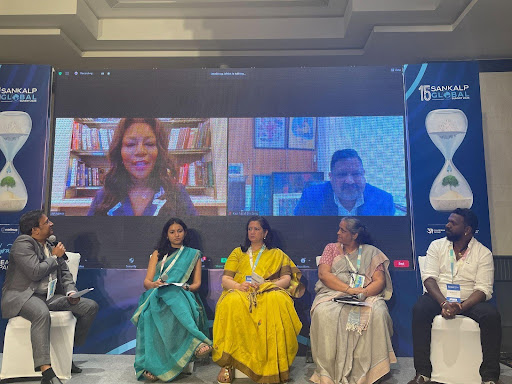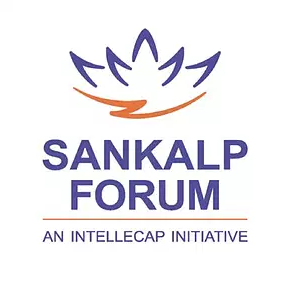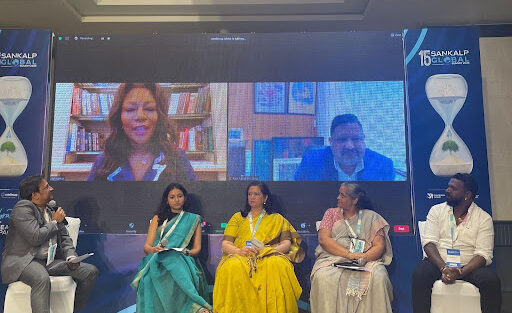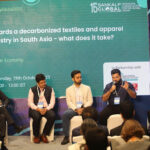At the 15th Sankalp Global Summit, the session “Moving the Needle: A Just and Inclusive Transition towards Circular Fashion” hosted by Circular Apparel Innovation Factory (CAIF) brought together key experts who brought diverse lenses to the discussion on the topic. This insightful discussion featured Ms. Abeer Al Fouti from Alwaleed Philanthropies, Mr. Kazi Faisal Bin Seraj from The Asia Foundation, Ms. Leena Dandekar from Raintree Foundation and Raintree Family Office, Ms. Mansi Kabra from the Good Business Lab, Ms. Nalini Shekhar from Hasiru Dala, and Mr. Krishna, a waste entrepreneur and representative of the waste worker voice. Mr. Somatish Banerji from CAIF was in charge of moderating the session.


Bottom left to right: Mr Somatish Banerji Partner, Intellecap (CAIF), Ms Mansi Kabra Associate Director, Good Business Lab, Leena Dandekar Founder & Director, Raintree Family Office and Raintree Foundation, Ms Nalini Shekar Co-Founder, Hasiru Dala, Mr Krishna. Top left to right: Ms Abeer Al Fouti, Executive Manager – Global Initiatives, Alwaleed Philanthropies; Mr Kazi Faisal Bin Seraj Country representative- Bangladesh, The Asia Foundation
The Fashion sector operates in the backdrop of a disconcerting reality characterized by worker exploitation throughout the supply chain, brands often disassociating themselves from supply chain issues, and the exploitation of tax havens and loopholes by major fashion houses, all to the detriment of local communities where they operate. While major brands are now embracing circularity, it’s unfortunate that the transition to circular fashion is taking place against the backdrop of widening socio-economic disparities. We cannot dream about a sustainable future without moving hand-in-hand with the people who form the backbone of our economies.
In the global pursuit of sustainability, the concept of a ‘Just Transition’, particularly in the context of the Global South, has gained prominence. As articulated by Krishna, a visionary waste entrepreneur from a third-generation waste-picker family, a Just Transition means including the worker’s voice, ensuring safe working environments, and fair wages. This vision is vital as we aspire to build a future within planetary boundaries while addressing the needs of all. Which raises the question: How can we practically ensure a fair and equitable shift towards sustainability?
The Power of Evidence in Shaping a Circular Future
In the journey toward a circular fashion industry, evidence emerges as a vital catalyst for change. Evidence plays a foundational role in demonstrating the robust connection between business profitability and worker well-being and it empowers brands and manufacturers to invest in worker training. Mansi Kabra illustrated this approach by showcasing how Good Business Lab (GBL) uses quantitative evidence to ensure improved health, safety, productivity, and retention of garment workers while driving business profitability at the same time. In short, a win-win for both workers and their employers.
For example, a research project conducted by GBL that emphasized on the significance of soft skills in empowering women garment workers not only demonstrated remarkable improvements in worker well-being but also resulted in tangible benefits for the business. Conversely, their investigation into the low usage of sanitary pads among female workers revealed that the issue extended beyond mere availability and required improved access. This awareness guided the development of effective interventions that had a positive impact on both worker well-being and productivity.
Building an Ecosystem for a Just Transition
It’s the cultivation of the right ecosystem, supported by policies and networks, that encourages workers and other stakeholders to collaborate and support each other. Nalini Shekhar, the founder of Hasiru Dala, champions the collaborative approach. She highlighted the essential role played by various ecosystem actors in driving the transition towards a circular economy which places worker welfare at the forefront.
Krishna also emphasized the instrumental support provided by organizations like Hasiru Dala in his transformative journey from a waste picker to an entrepreneur managing waste for the Indian Army. His early recognition of the textile waste problem and collaboration with ecosystem enablers like CAIF had led to the successful systematization of textile waste collection and sorting as well as linkages with markets for textile waste.
Building a Skilled Workforce for a Just Transition
Faizal bin Seraj, the Country Representative for The Asia Foundation in Bangladesh, advocated for a holistic approach to transform the Textile and Apparel (T&A) industry. Mitigating the disruptive impact of technology and AI in Bangladesh’s T&A sector necessitates skilling textile and garment workers to prepare for the anticipated shifts and prevent future job losses. A focus on vulnerable groups, particularly women, is additionally necessary for ensuring an equitable transition. Faizal highlighted CAIF’s initiatives under H&M Foundation’s Project Oporajita which follow this approach. CAIF, under Project Oporajita, is equipping out-of-work women garment workers with circular skills to prepare them for the future of jobs.
The emphasis on building a skilled workforce goes beyond job skills to a host of other life skills obtained through financial and legal literacy, empowering workers with knowledge about utilizing government resources for their well-being.
Approaching certain aspects from a gender-based perspective often also yields pleasant surprises for worker well-being. An impressive 84% of waste entrepreneurs created through Hasiru Dala’s sustained support are women, who tend to implement the right policies for their workers, particularly through a gender lens. These waste entrepreneurs in addition to ensuring workplace safety also take it upon themselves to sensitize their workers on issues which have an impact on worker well-being, such as domestic violence and alcoholism.
The Role of Capital to Catalyze Change
Leena Dandekar from the Raintree Foundation and Abeer Al Fouti from Alwaleed Philanthropies, brought in the funding lens to the discussion and shed light on their organizations’ investments rationale for a sustainable future. They reiterated their commitment to funding initiatives that create equitable opportunities, ensure community well-being while addressing the challenges posed by climate change.
Abeer also underscored the importance of strategic partnerships, which act as bridges for philanthropic capital and grassroots initiatives. Organizations such as Intellecap (through its initiative CAIF), and Enviu play a pivotal role in ensuring that philanthropic investments directly impact grassroots projects, as evidenced by programs like ‘Closing the Loop on Textile Waste.’ This initiative aims to generate green job opportunities while addressing the environmental challenges associated with textile waste.
In conclusion, while the journey towards realizing an inclusive and sustainable textile and apparel industry is long, concerted efforts by diverse ecosystem stakeholders can ignite a butterfly effect of positive change and help strengthen the case for collaborative initiatives at scale, for making the industry’s transition towards circularity, just and inclusive.




